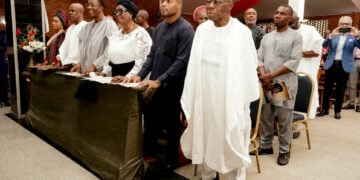The programme manager, Global Rights initiative Mr Edosa Oviawe, has called on the federal, state and local governments to ensure the participation of women with disabilities in decision making in the country.
He stated this at the stakeholders’ Intergenerational Fireside Dialogue Forum with the theme: “Navigating the Civic Space and Advancing Inclusivity with Nigeria’s New Administration,” organised by Global Rights in collaboration with the Heirich Boll Stiftung foundation.
While addressing journalists, Oviawe said the stakeholders’ engagement is focused on addressing issues critical to Nigeria’s civic space, particularly how civil society can further engender participatory governance that captures the participation of traditionally excluded groups, including – young women, people with disabilities, and people not present on social media, in this new administration.
According to him, when talking about shrinking civil space there are structural exclusions for both women, youths and people with disabilities.
He noted the barriers encountered by women and girls living with disabilities in participating in public decision-making processes and called for special attention to guarantee their rights to participate actively and directly in all decision-making processes affecting their lives.
On his part, a public affairs analyst, Jide Ojo said, “We need to collectively work together towards breaking the bias and promoting the inclusion of women with disabilities, supporting women and girls’ empowerment and movements that involve women with disabilities themselves in decision-making, processes that provide platforms for them to become leaders is very essential.
“Having women with disabilities in leadership will reduce the negative attitudes and stigma towards them as well as reduce the risks of violence. Furthermore, the meaningful participation of women and girls with disabilities in project planning and implementation processes is necessary if we want to ensure that interventions and policy formulations are inclusive of them.”
Meanwhile the development expert, Weyinmi Eribo said women and girls with disabilities in Nigeria are discriminated against based on both their gender and disability in many aspects of their lives.
Due to this intersectional discrimination, women with disabilities in Nigeria are subjected to harmful stereotypes that undermine their dignity, places barriers in front of their full inclusion in society including their ability to access justice, heighten their risk of sexual violence, and impact their access to sexual and reproductive health care.
These issues affect women with disabilities in conflict and non-conflict areas of Nigeria, and although many of these issues impact all women in Nigeria, they disproportionately impact women with disabilities




